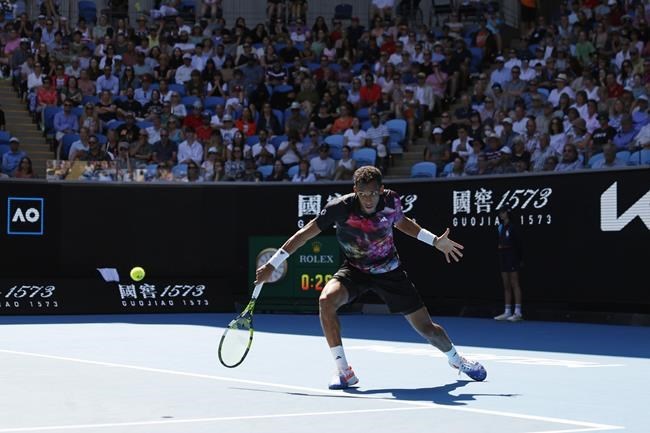MELBOURNE, Australia — A golden opportunity to make his second consecutive Australian Open quarterfinal went all wrong for Canadian Félix Auger-Aliassime on Sunday.
The sixth-seeded Auger-Aliassime was defeated 4-6, 6-3, 7-6 (2), 7-6 (3) by No. 71 Jiri Lehecka of the Czech Republic, an unseeded player who already had upset No. 21 seed Borna Coric and No. 11 Cameron Norrie earlier in the week. The Montreal native said he has had a tough week.
"I gave everything I had. I had some good moments. But too many parts of my game were not at the level they need to be in order to win against players like him and the other players in the draw," said Auger-Aliassime after the loss. "It's O.K. I mean, it's how it is.
"I'm proud of my effort. I gave everything. But my level isn't where I want it to be."
This Australian Open is the first time Lehecka, who at 21 is 15 months younger than Auger-Aliassime, has ever won a main-draw match at the Grand Slam tournament level.
This year’s Australian Open remains wide open. Only nine-time champion Novak Djokovic has ever won an Australian Open title, or any Grand Slam title at all, among those still in the men’s singles.
Auger-Aliassime never found his groove in Melbourne, quite unlike a year ago.
Before the main event in 2022, Auger-Aliassime and teammate Denis Shapovalov led Canada to a win at the ATP Cup team event. And so he came into Melbourne with some momentum and battled through some difficult opponents to make the quarterfinals, where he lost in five sets to Daniil Medvedev (who weeks later, would become world No. 1).
This Australian trip was, by that standard, a disappointment.
It began in Adelaide, where Auger-Aliassime was the No. 2 seed and ran into junior rival Alexei Popyrin in his opening match of the season.
Popyrin, ranked No. 120, defeated him in straight sets and robbed him of further match play coming into the first Grand Slam tournament of the 2023 season.
And then there were the tennis balls – the Dunlop balls that replaced the Wilson brand at the Australian Open in 2019, and have been the subject of criticism ever since for the way they fluff up after just a few games.
The criticism this year has been exponentially louder; even Djokovic and Rafael Nadal had their say.
After Auger-Aliassime came back from being down two sets to none to win his second-round match against Alex Molcan of Slovakia, the Canadian was vocal in pointing out that the balls didn’t favour his highly top-spun shots, bounced very low and were of dubious overall quality.
He got past Molcan, despite that. He also made the decision to drop the string tension in his rackets in the hope of getting a little more sting on his shots.
That helped with Auger-Aliassime's serve, to some extent. But lower tension also means less control. That was evident against Lehecka, who built up a 6-0 lead before Auger-Aliassime could win his first point
“We played two tiebreaks. In the first tiebreak I was playing much better. In the second tiebreak, it was 50/50,” said Lehecka, who will meet No. 3 seed Stefanos Tsitsipas in Tuesday's quarterfinals. “I played one incredible shot, forehand down the line which he totally didn't expect to happen. Then there were a few moments where I played great tennis. And he helped me with a few mistakes.”
Lehecka, officially six-foot-one and 179 pounds, has nothing of Auger-Aliassime’s strong physique. But he served nearly as hard. Notably, he came to the net a lot more, going 33-for-41 on net approaches while Auger-Aliassime won just 11-of-26 his.
"It did go so fast. I was satisfied with my first set; I served well. I won the first (set), he won the second, no problem," said Auger-Aliassime. "For me, the biggest problem after that was that I really couldn’t find a solution to really get him in trouble on his own serve.
"I continued to serve well. I was able to get out of some complicated situations. On return, I tried to vary my position but I couldn’t get my bearings. I couldn’t find any precision."
With Auger-Aliassime’s defeat, the “Netflix Curse” that has been the subject of much humorous discussion is complete.
Auger-Aliassime was the last one standing of the 10 players featured in the first five episodes of the new reality TV series, released just before the start of the Australian Open.
Three of the stars were injured and withdrew before the event began. No. 2 seeds Casper Ruud on the men’s side and Ons Jabeur on the women’s side were eliminated early.
Meanwhile, in women's doubles, Ottawa's Gabriela Dabrowski and Mexican partner Giuliane Olmos defeated Switzerland's Belinda Bencic and Jill Teichmann 4-6, 6-2, 6-4 to advance to the third round against Americans Carolina Dolehide and Anna Kalinskaya.
The Americans advanced by bouncing Russians Anastasia Potapova and Yana Sizikova 6-0, 6-1.
Dabrowski and Olmos had 47 winners in their two-hour and six-minute match, and only one ace compared to five for Bencic and Teichmann.
Dabrowski also teamed up with mixed doubles partner Max Purcell of Australia to defeat Jan Zielinski and Yang Zhaoxuan 6-2, 7-5. They will now face the Australian combo of John-Patrick Smith and Lizette Cabrera in the second round.
---
This report by The Canadian Press was first published Jan. 21, 2023.
Stephanie Myles, The Canadian Press


